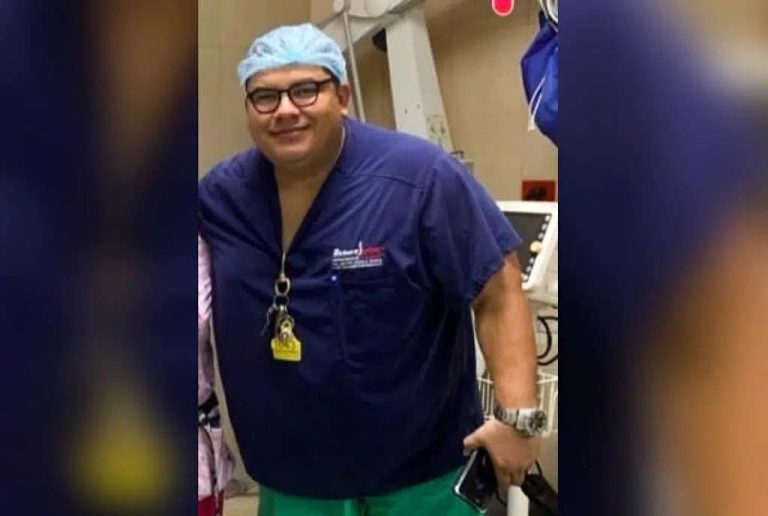27 de marzo 2022

Children of Exile: The Births “Sowing Hope” in the Camp of Nicaraguan Farmers

PUBLICIDAD 1M
PUBLICIDAD 4D
PUBLICIDAD 5D
Dr. Jairo Gutierrez has attended some of the victims of aggression, among them Justo Rodriguez, who was sent home from jail in painfully bad condition

Dr. Jairo Gutierrez has attended some of the victims of aggression
Neurosurgeon Jairo Gutierrez, one of the doctors who have quietly treated the victims of the repression since 2018, has gone into exile for his safety. The doctor, who had continued his work in defiance of the Ortega regime, was brutally assaulted in Managua on February 5th. The attack, following years of threats on social media and even written warnings on the walls of his farm in Carazo, was the last straw
Gutierrez declined to offer any further details regarding his departure from Nicaragua. Regarding the assault, he stated that on February 5, on his way back home to Managua after a long workday, he stopped at a pharmacy to buy some things. At that moment, three unknown individuals assaulted him, causing a cut on his right eyebrow that required five stitches.
Gutierrez stated that one of his aggressors stood right by the front door of his vehicle, without directing a word at him. The doctor, aware that it was an assault, attempted to go around the vehicle in order to avoid him, but he was then attacked from behind. The first attacker was followed by two others. The attackers stopped only when a youth driving a three-wheeled motor-cart came up to them and asked: “What’s going on there?”
“At that moment another motor-cart came and took [the aggressors] away,” Gutierrez explained from exile. He added that he went to the police to denounce his case but received no response.
Since the political crisis in 2018, the specialist has been the object of threats on social networks, forcing him to close his Facebook account, among other measures.
On the walls of one of his farms and of a house he owns in Diriamba, Carazo, groups of fanatical followers of the government party scrawled insults, calling him a “coup-plotter”, a “road-blocker”, adding the words “PLOMO” [lead] and the threat: “We’re going to kill you; we know where you live.”
“I don’t follow any political figure. I’ve given my assistance to whoever has sought me out and needs help, no matter who they are. It’s not my job to tell you, ‘I won’t see you because you’re such-and-such a thing.’ I’ve always been very neutral in that sense,” explains Gutierrez. Jairo Gutierrez has been a doctor for 19 years and a specialist for eight.
One of the most notorious cases of a political prisoner whose health collapsed completely during his captivity was that of Justo Rodriguez, who the specialist treated. At the beginning of 2021, Rodriguez was sent home to his family on Ometepe Island in terrible condition after eight months in jail. He had a wound but didn’t know with what they had hit him. Gutierrez was incredulous, seeing the deplorable condition Rodriguez was in, with effects he’s still not been able to recover from.
The neurosurgeon notes that Nicaragua’s health system has displayed [political] partiality, thus violating the core principle of guaranteeing the welfare and life of all individuals, regardless of their race, color, gender or political orientation. Proof of this partiality is that victims of the repression and the political prisoners “can’t be attended in public health facilities and must come to [independent] doctors like us. We’ve supported them, so that they could find relief from their chronic health problems and other conditions.”
Gutierrez stressed that the independent doctors are completely shut out of the Health Ministry. The Nicaraguan Medical Unit (UMN), an independent association Gutierrez belongs to, calculates that 459 health workers have been fired since 2018, for extending their medical services to the opposition. Added to this are another 57 health workers who criticized the Nicaraguan Health Ministry (Minsa) for their cover-up of the COVID-19 pandemic.
According to a Confidencial investigation published March 6, 2022, 14,815 Nicaraguans died from the Covid pandemic between March 2020 and December 2021. Despite this, the Nicaraguan health authorities only recognize 218 deaths. The substantially greater number was derived from an analysis of Minsa’s own health data map.
“It’s sad, but they’re practically perverting the medical profession by subordinating it to the political powers, forcing doctors to reproduce an ideology,” commented another doctor, speaking on condition of anonymity to avoid reprisals.
Attorney Yonarqui Martinez, one of the best-known defenders of Nicaragua’s political prisoners, stated on her Twitter account that Dr. Gutierrez’ work was no crime, and that the February incident was an attempt on his life.
The neurosurgeon recognized that he’s in “a sea of confusion” regarding what he’ll do in exile. He explained that he initially fled as an instinctive measure to safeguard his life, knowing “obviously, returning to Nicaragua would be difficult.”
“If I go back, who knows what will happen to me,” he added.
“I hope that one day we wake up from this nightmare. The problem is that we’re inside a system that has seeded fear in all of us. I’m far away, and I’m afraid to speak, not only for myself, but for what could happen there. That shouldn’t be. We’re all free to express what we want, especially when there’s injustice. Systems like the one we have in our country shouldn’t exist,” Gutierrez affirmed. He believes that Nicaraguans will survive the “failed State”.
This article was originally published in Confidencial and traslated by Havana Times
PUBLICIDAD 3M
Periodista nicaragüense, exiliado. Comenzó su carrera en el año 2000, cuando todavía era estudiante. Por sus destacadas investigaciones periodísticas ha ganado el Premio Ortega y Gasset, el Premio Internacional de Periodismo Rey de España, el Premio a la Excelencia de la Sociedad Interamericana de Prensa, y el Premio Latinoamericano de Periodismo de Investigación del Instituto Prensa y Sociedad (IPYS).
PUBLICIDAD 3D